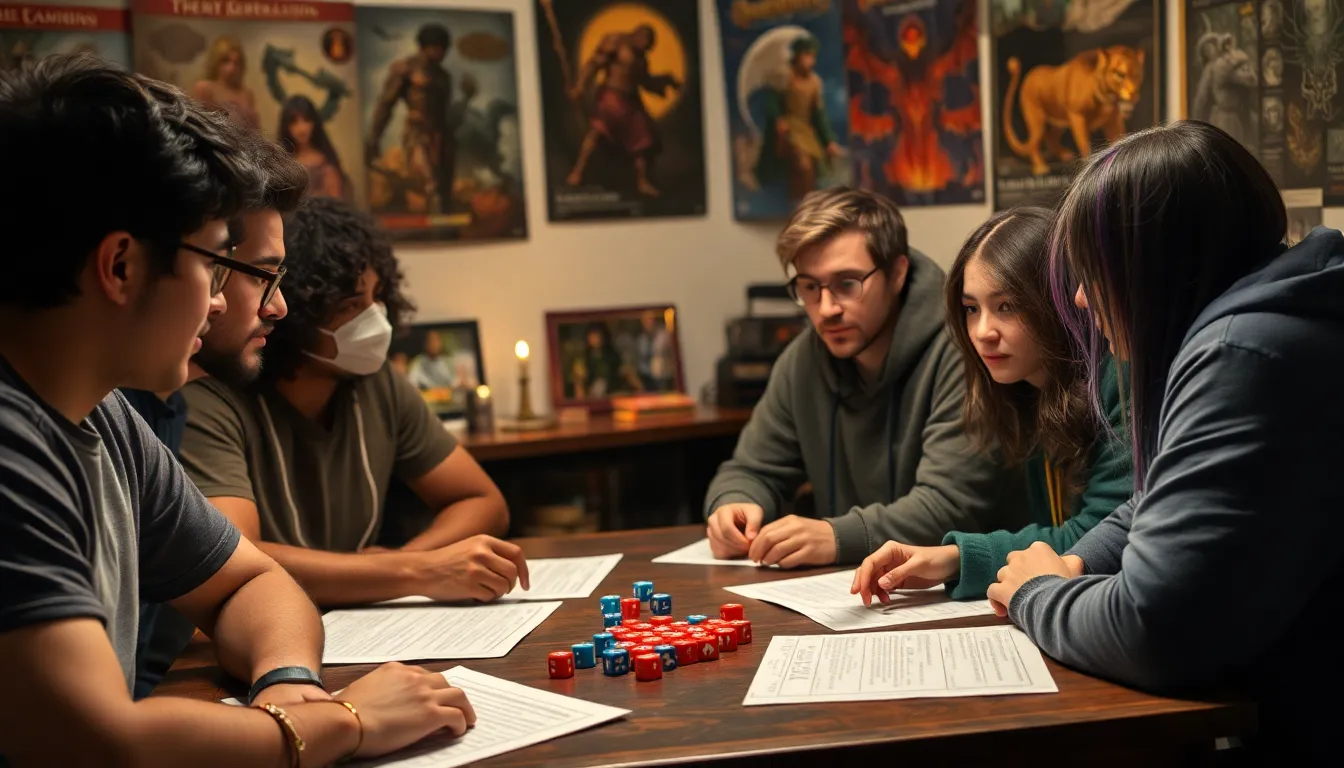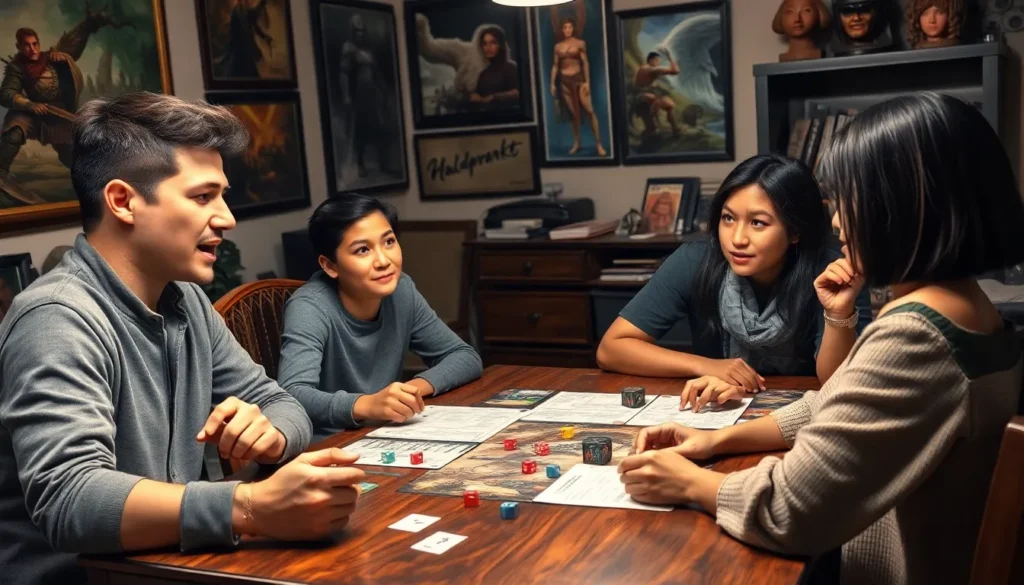Table of Contents
ToggleIn the world of role-playing games, players often find themselves at a crossroads where choices aren’t just choices—they’re moral dilemmas that can leave them scratching their heads. Should they save the village or steal the treasure? Help the helpless or pursue personal glory? These decisions add a rich layer of complexity that transforms a simple game into a thought-provoking adventure.
Moral dilemmas in RPGs not only challenge players’ ethics but also spark lively debates and unforgettable stories. They bring a unique twist to gameplay, where every choice can lead to unexpected consequences. So grab your dice and prepare for a journey that’s equal parts laughter and introspection. After all, who knew saving the world could be so complicated—and entertaining?
Overview of Moral Dilemmas in RPGs
Moral dilemmas in role-playing games (RPGs) create unique and thought-provoking scenarios. Players face choices that test their ethical beliefs and character motivations. Decisions such as sacrificing a few to save the many introduce layers of complexity. Engaging with such dilemmas encourages discussion and debate among players, often leading to emotional connections and memorable gameplay.
Consequences arise from these choices, impacting storylines and character interactions. In one scenario, siding with a tyrant offers riches but at the cost of the innocent. Alternatively, aiding the oppressed may lead to hardship but fosters alliances. Both paths shape a player’s experience, influencing character development and future decisions.
Game designers carefully craft these dilemmas to enhance immersion. Well-implemented moral choices often lead to branching story paths. Each decision can radically alter the outcome, heightening replayability. For instance, a game’s ending can shift dramatically based on the player’s earlier choices, showcasing the weight of their decisions.
Interactive narratives serve to deepen player engagement. Players not only control characters but also navigate complex emotional landscapes. As they confront moral challenges, they reflect on real-world values and beliefs. Such moments can provoke self-examination regarding morality and ethics in an entertaining context.
Understanding the role of moral dilemmas enhances appreciation for RPGs. Emphasizing the importance of these choices redefines gameplay beyond mere statistics or actions. Heavier decisions provoke critical thinking, inviting players to explore the gray areas of right and wrong. Therefore, facing moral dilemmas becomes a core element of the RPG experience, enriching player involvement and storytelling depth.
Importance of Moral Decisions in Gameplay

Moral decisions play a vital role in RPGs, shaping player experiences and narratives significantly. They challenge players to confront ethical dilemmas, fostering deeper engagement and reflection.
Impact on Player Experience
Moral choices influence how players connect with the game world. Players often feel a sense of agency with each decision, enhancing their emotional investment. Choices like betraying a friend or saving a town lead to powerful reactions and encourage discussions. The way characters respond to these decisions adds layers to interactions, making gameplay more immersive. Players remember the consequences of their actions, creating lasting memories tied to their ethical choices. Engagement deepens, as moral dilemmas often resonate with personal values, prompting players to think critically about their decisions.
Narrative Development
Narrative progression hinges on moral decisions in RPGs. Game designers implement these dilemmas to create branching storylines, allowing for varied outcomes based on player choices. Each decision has the potential to alter character arcs, leading to unique narrative experiences. The complexity of moral dilemmas enriches the storyline, drawing players into the plot. Consequences emerge from choices, impacting relationships and world events significantly. Players experience a dynamic narrative landscape that evolves with every moral decision, making the gaming experience unique and compelling.
Types of Moral Dilemmas in RPGs
Moral dilemmas in RPGs manifest in various types, each presenting unique challenges that provoke thought and discussion.
Ethical Conflicts
Ethical conflicts arise when players must choose between two opposing moral principles. For instance, saving a character may lead to dire consequences for others. Players might find themselves torn between loyalty to friends and doing what is right for the greater good. These decisions often involve weighing immediate benefits against long-term implications. Choices like betraying a comrade for personal gain exemplify this conflict, illustrating the moral weight of decisions. Conflict emerges not just in individual choices, but in how these decisions affect relationships with NPCs and the game world. Each ethical decision contributes to character development and shapes the overarching narrative landscape.
Situational Challenges
Situational challenges in RPGs compel players to respond to pressing scenarios with limited time to ponder their choices. For example, players may face a ticking clock while deciding whether to rescue civilians from an imminent threat or pursue a valuable objective. These urgent situations heighten tension and reinforce the notion that decisions truly matter. Players encounter dilemmas that force them to prioritize their goals, often impacting personal character arcs and the game’s outcome. Such challenges stimulate discussion and reflection on the morality of actions taken under pressure. In facing these dilemmas, players deepen their engagement with the narrative and experience the consequences of their choices.
Examples of Popular RPGs Featuring Moral Dilemmas
Many RPGs incorporate moral dilemmas that profoundly impact gameplay. These choices challenge players to consider their values and the consequences of their actions.
The Witcher Series
The Witcher series presents numerous moral quandaries, particularly in quests involving the fates of characters. Players often face decisions that test their sense of justice against personal interests. For instance, choosing whether to side with a distraught mother or a monster reveals the complexity of morality. Each choice branches into different outcomes, affecting relationships and the world around Geralt. This layering of ethical conflicts enriches the narrative while deepening emotional connections.
Mass Effect Series
The Mass Effect series excels in creating moral dilemmas that resonate throughout its expansive universe. Players regularly face critical decisions that influence alliances and the overall fate of entire species. For example, deciding whether to save the Krogan or focus on the needs of the Salarian species introduces a significant ethical conflict. Such moments elevate the stakes, urging players to contemplate the impact of their choices on the galaxy. The consequences ripple through the storyline, fostering a dynamic experience tailored by individual player decisions.
How To Create Engaging Moral Dilemmas in RPGs
Creating engaging moral dilemmas involves thoughtful design that sparks player reflection and discussion. Ethical choices serve as the backbone of these dilemmas, creating intricate scenarios that challenge players at a fundamental level.
Designing Ethical Choices
Ethical choices must resonate with players’ values and beliefs. Players often find themselves torn between loyalty and justice, pushing them to make tough decisions that reflect their character’s ethics. Introducing characters with contradicting motivations enhances conflict. For example, a player’s friend may demand loyalty, while the greater good calls for a different path. Structuring scenarios where choices impact not just the immediate situation but also the long-term relationships deepens the player’s emotional investment. Each decision should feel significant, with the potential to alter character arcs and storylines.
Balancing Consequences
Consequences of decisions should align with the choices made. Players need to see the results of their actions as direct and meaningful. Immediate outcomes create a sense of urgency, while long-term effects shape the narrative landscape. For instance, choosing to save a few villagers may lead to unforeseen repercussions later in the game. Each consequence must feel authentic, affecting world events and character relationships. Balancing negative and positive outcomes keeps players engaged and encourages them to think critically. Reinforcing the significance of their decisions fosters a richer gameplay experience, inviting deeper exploration of the game world.
Moral dilemmas in RPGs are more than just plot devices; they’re essential elements that shape player experiences. By challenging ethical beliefs and prompting meaningful discussions, these dilemmas transform gameplay into a rich narrative journey. Players are not merely participants; they become active decision-makers whose choices resonate throughout the game world.
As players navigate complex scenarios, they forge deeper emotional connections with characters and storylines. This dynamic interplay enhances immersion and elevates replayability, making each playthrough unique. Ultimately, the thoughtful design of moral dilemmas invites players to explore their values and the consequences of their actions, creating an engaging and memorable gaming experience.







